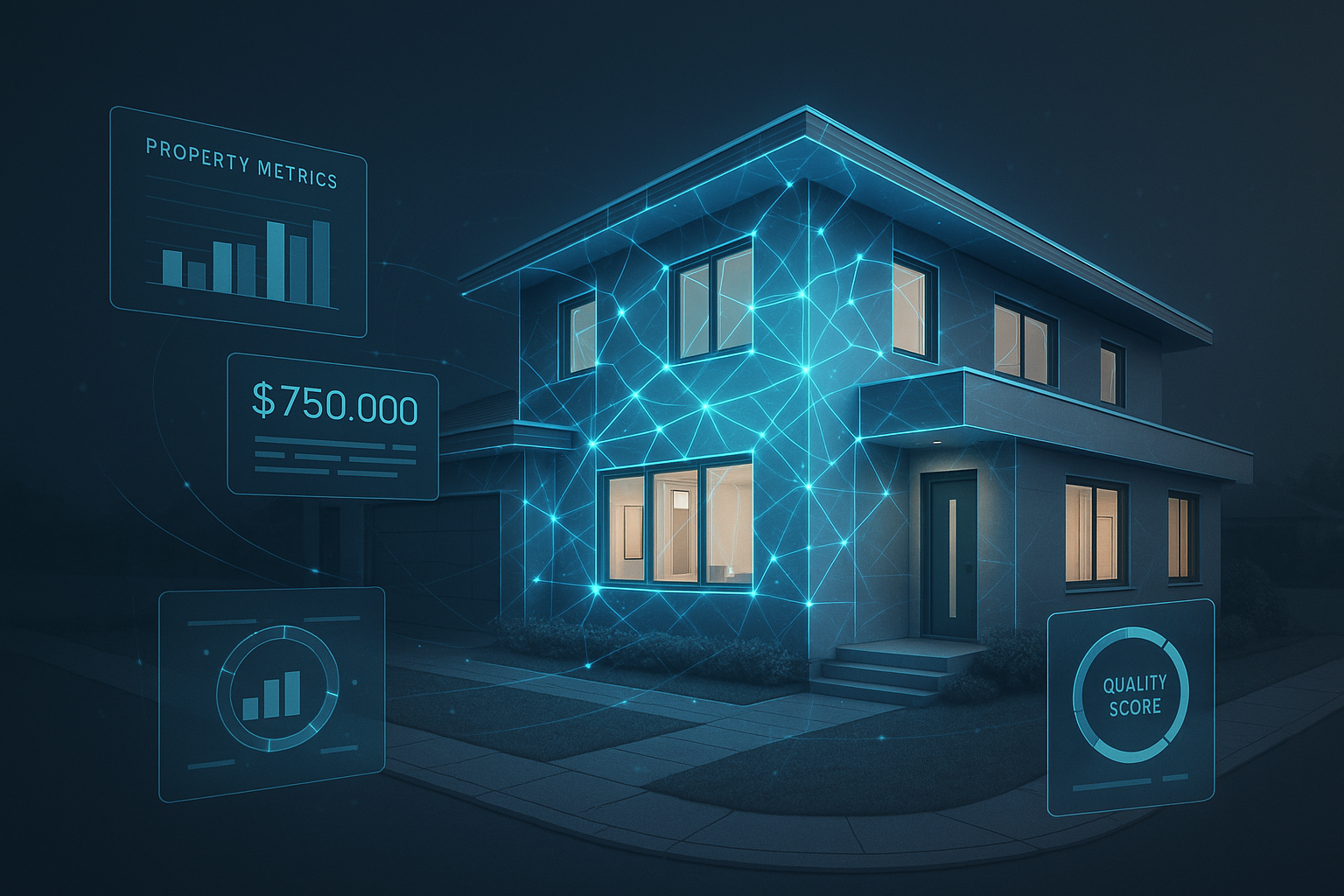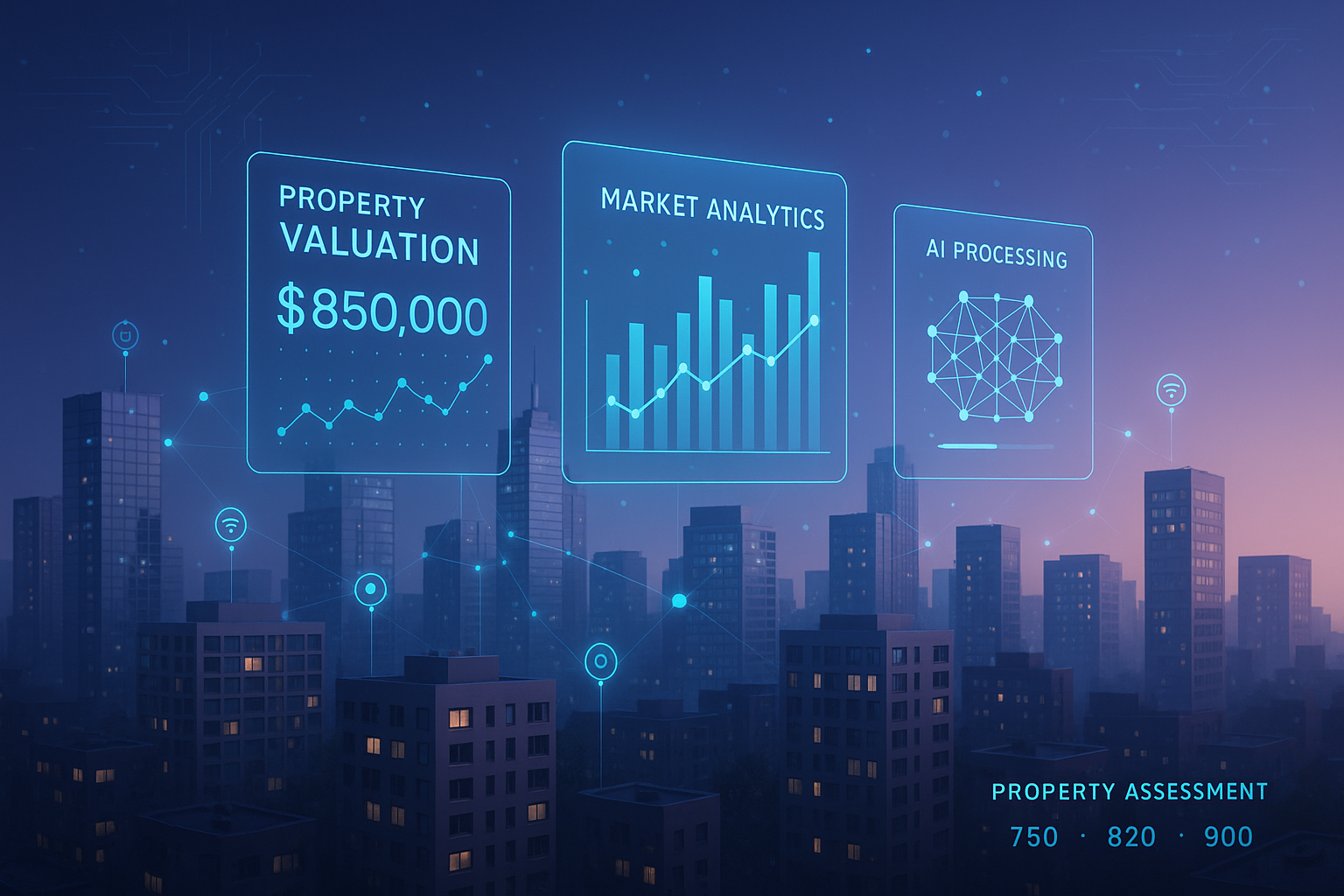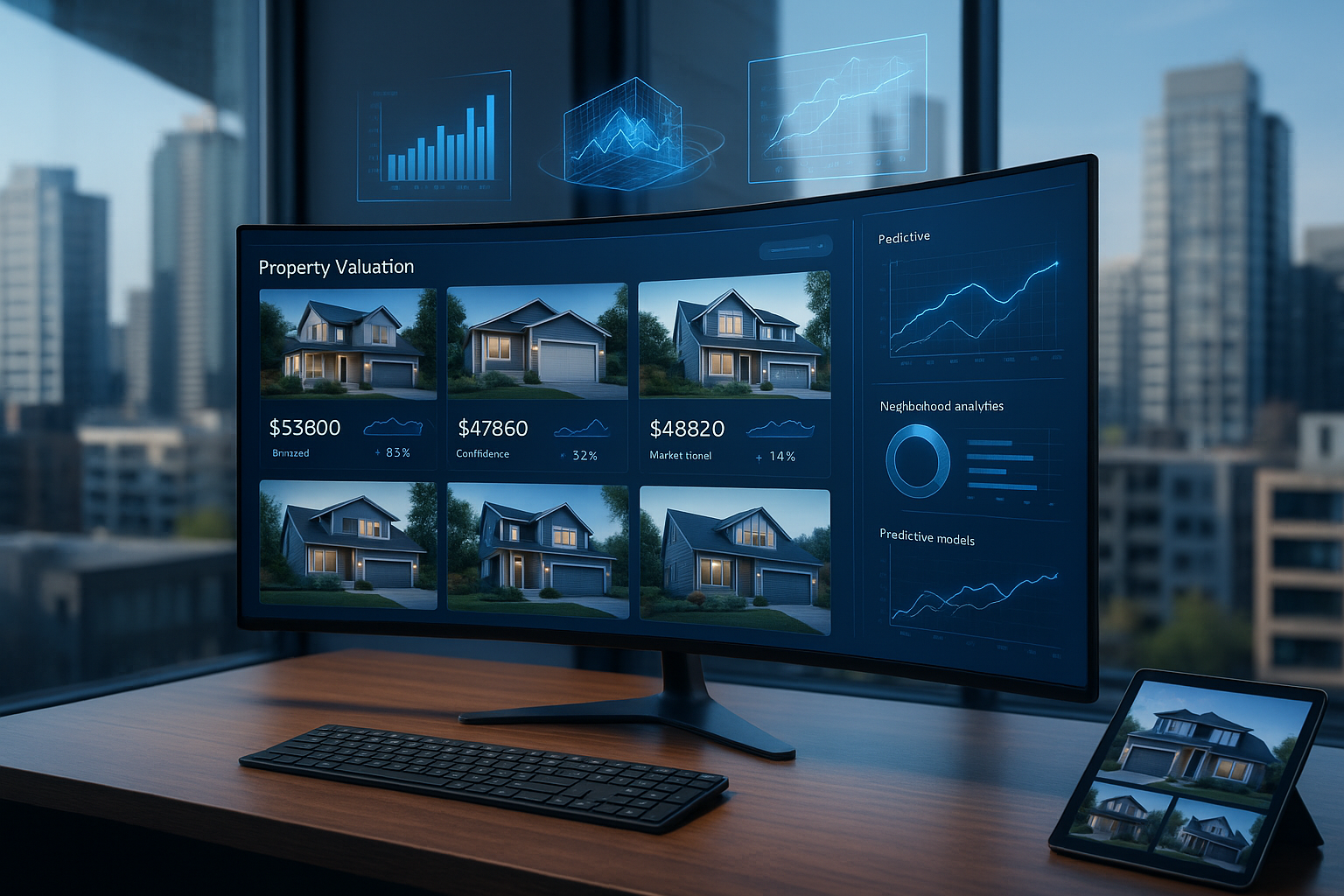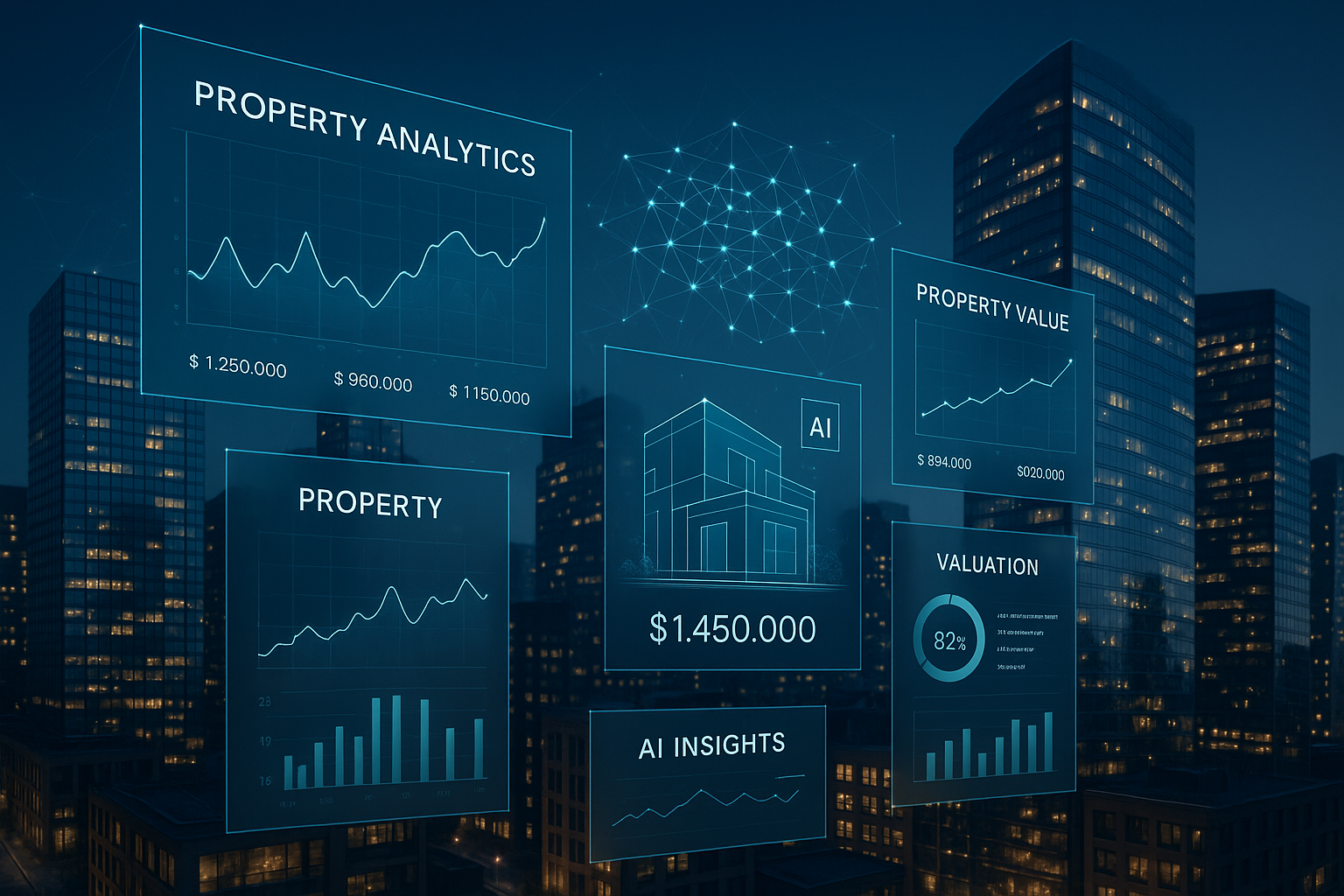
AI Computer Vision Transforms Property Assessment: A 2025 Guide to Automated Valuation & Quality Analysis
Caiyman.ai Research Team
AI Solutions Architect
The property assessment industry is experiencing a seismic shift. With over 1 million property photos uploaded daily in the US alone and AI-enhanced Automated Valuation Models (AVMs) reducing error rates from 5-6% to 2-4%, computer vision technology is not just changing how we evaluate properties—it's redefining the entire industry. Research from Boston housing studies shows that computer vision analysis can correlate with $68,000 higher market valuations, while organizations implementing these technologies report 18% cost savings and operational efficiency improvements of 20-30%.
The convergence of PropTech and FinTech is creating unprecedented opportunities for data-driven property assessment workflows. As noted by industry analysts, this fusion dramatically improves efficiency, transparency, and access in financial and property markets. From sophisticated neural network architectures like CNNs and ResNet to explainable AI frameworks using LIME and SHAP techniques, the technological foundation for accurate, automated property evaluation has never been stronger.
Technical Foundation: Core AI Technologies Powering Property Assessment
At the heart of AI-driven property assessment lies a sophisticated ecosystem of machine learning and computer vision technologies. These systems rely on supervised learning models trained on labeled property data, where images are systematically marked with property attributes, condition assessments, and valuation labels. According to comprehensive research on AI in real estate, this approach has proven highly effective for correlating visual traits to property values.
The most successful implementations utilize multi-modal integration, combining image recognition with textual data, market analytics, and geospatial information. This hybrid approach enables AI systems to understand not just what they see in property images, but also the broader context that influences valuation—from neighborhood characteristics to market trends.
Neural Network Architectures for Property Analysis
Modern property assessment systems leverage several proven neural network architectures, each optimized for specific aspects of property evaluation:
- Convolutional Neural Networks (CNNs): The backbone of image pattern recognition, CNNs excel at identifying architectural features, materials, and structural elements in property photos.
- ResNet and EfficientNet architectures: These advanced models provide deep feature extraction capabilities, enabling systems to analyze complex visual patterns that correlate with property value and condition.
- Multi-instance Deep Ranking & Regression Networks (MiDRR Net): Specifically designed for property valuation, these networks can process multiple property images simultaneously to generate comprehensive assessments.
Research by Wan & Lindenthal (2023) demonstrates that these architectures, when properly validated, consistently outperform traditional valuation methods in both accuracy and reliability.
Computer Vision Feature Detection
Advanced computer vision systems can automatically identify and assess numerous property features that directly impact valuation:
- Structural elements: Doors, windows, façade materials, roof conditions, and architectural styles
- Quality indicators: Property maintenance levels, material conditions, and aesthetic appeal
- Neighborhood context: Surrounding properties, amenities, and environmental factors that influence market value
Critical to this process is the implementation of explainable AI techniques such as LIME (Local Interpretable Model-agnostic Explanations) and SHAP (SHapley Additive exPlanations). These frameworks ensure model transparency and regulatory compliance by revealing which visual elements most influence AI predictions—essential for high-stakes valuation decisions.
Real-World Applications: AI Success Stories in Property Valuation
The theoretical promise of AI computer vision is being realized across multiple sectors of the real estate industry, with documented case studies showing significant improvements in accuracy, efficiency, and cost-effectiveness.
Automated Valuation Models (AVMs) are leading the transformation. Industry research shows that AI-enhanced AVMs process vast datasets that far exceed the manual analysis capacity of traditional appraisers. A Deloitte case study reported a 12% increase in ROI compared to conventional decision-making approaches, with operational cost reductions of 20-30% documented across multiple implementations.
Perhaps the most compelling evidence comes from real-world valuation studies. In a comprehensive Boston housing analysis, researchers found that a one standard deviation improvement in visual appearance—as objectively scored by computer vision—correlated with approximately $68,000 higher market valuation at the sample mean. Remarkably, computer vision analysis outperformed many traditional variables typically used for property value prediction.
Industry-Leading Implementations
Restb.ai exemplifies the practical application of computer vision in property assessment. The platform processes over 1 million property photos daily, providing automated image analysis for property appraisal and inspection automation. Their computer vision technology enables compliance teams to monitor every photo in real estate systems, ensuring quality and content standards critical for professional success.
In the mortgage industry, Fannie Mae's Desktop Underwriter demonstrates how AI can accelerate application decisions while improving accuracy. By automatically processing vast borrower datasets, the system enables faster, more precise underwriting than traditional manual methods. Similar innovations from companies like Scienaptic AI and DigiFi integrate AI-powered credit decisioning into loan origination systems for seamless, automated lending workflows.
Commercial real estate is experiencing equally dramatic transformation. Skyline AI provides investment analysis and asset optimization platforms that offer unique competitive advantages through AI-driven insights unavailable elsewhere. Their bid-first underwriting capabilities enable partners to confidently bid on large numbers of potential assets before competitors can even begin their analysis.
The insurance sector is also embracing these technologies. Current industry trends show AI-driven computer vision revolutionizing property insurance through real-time damage assessments using drones and satellite imagery. This enables rapid damage evaluation, automated claims estimates, and more accurate risk profiling based on property and neighborhood conditions.
Implementation Strategies: Expert Recommendations for Success
Successful AI computer vision implementation in property assessment requires a strategic approach that balances technical sophistication with practical business needs. Leading industry research emphasizes the importance of hybrid and multi-modal architectures that integrate diverse data sources through custom AI pipelines combining machine learning, natural language processing, and computer vision.
Segment-specific solutions prove most effective, with AI models tailored to the nuanced needs of residential, commercial, and investment property sectors. This approach recognizes that each market segment has unique characteristics that influence valuation methodologies and risk assessment protocols.
Data Infrastructure Requirements
The foundation of any successful AI property assessment system lies in robust data infrastructure. According to Deloitte's 2025 Commercial Real Estate Outlook, many firms underestimate the need for high-quality, AI-ready data, making data readiness assessment and infrastructure upgrades critical before AI deployment.
Key requirements include:
- Standardized databases: Moving away from siloed or ad-hoc data sources toward integrated, consistently formatted information
- Automated validation systems: Implementing real-time data quality monitoring and bias detection protocols
- Comprehensive governance: Establishing stringent processes for data ingestion, cleansing, validation, and update cycles
Model Deployment and Monitoring
Continuous real-world validation through pilot programs and A/B testing ensures AI models adapt to changing market conditions. Expert recommendations emphasize moving beyond academic testing to operational validation that compares AI performance against traditional assessment methods in live market conditions.
Essential monitoring protocols include:
- Performance tracking: Automated systems that continuously monitor model accuracy and flag performance degradation
- Drift detection: Algorithms that identify when model assumptions no longer align with current market conditions
- Automated retraining: Systems that trigger model updates when performance thresholds are breached
Integration best practices focus on connecting real estate systems with financial, insurance, and legal platforms through API-driven architectures and standardized data formats. This enables seamless workflow automation across the entire property transaction ecosystem.
Navigating Challenges: Risk Mitigation and Regulatory Compliance
While AI computer vision offers tremendous opportunities, successful implementation requires careful attention to risk mitigation and regulatory compliance. The high-stakes nature of property valuation and lending decisions demands rigorous approaches to bias detection, explainability, and ethical AI deployment.
Regulatory compliance represents a critical success factor. Industry guidance emphasizes adherence to core standards including the U.S. Fair Housing Act (FHAct) and Equal Credit Opportunity Act (ECOA), ensuring AI systems avoid discriminatory outcomes in lending, valuation, or marketing activities.
Emerging frameworks like the EU AI Act introduce risk-based compliance requirements that prioritize transparency, safety, and ethical deployment. Organizations must embed compliance considerations into AI design and operation lifecycles rather than treating them as afterthoughts.
Bias detection and mitigation strategies utilize fairness metrics and explainable AI frameworks to monitor and correct for potential discrimination. These systems are particularly important in lending and marketing applications where biased outcomes can have significant legal and ethical implications.
Risk assessment capabilities extend beyond compliance to include fraud detection, anomaly identification, and market volatility prediction. Advanced AI systems can identify suspicious patterns in property transactions, unusual valuation discrepancies, and other indicators of potential fraud or market manipulation.
Data privacy and security considerations are paramount given the sensitive nature of property and financial information. Implementation strategies must include robust encryption, access controls, and audit trails that meet regulatory requirements while enabling AI system functionality.
Future Outlook: 2025 Trends and Market Evolution
The property assessment industry is entering an era of accelerated AI adoption, with several key trends shaping the landscape for 2025 and beyond.
Generative AI integration represents perhaps the most significant emerging trend. Industry analysis shows exponential growth in generative AI deployment among insurance organizations, with cognitive, role-based AI assistants serving as digital co-workers across many processes. This technology enables automated report creation, enhanced property descriptions, and dynamic content generation that adapts to specific user needs.
PropTech valuations reflect this technological evolution. Recent market analysis of 216 PropTech companies reveals that AI-driven platforms command the highest revenue multiples due to their scalability, defensibility, and strong investor demand. This trend indicates continued capital flow toward innovative property assessment technologies.
Cross-industry integration is accelerating through multi-agent systems that enable coordinated property management, valuation, and portfolio optimization. These systems leverage autonomous software agents to automate complex workflows that previously required extensive human coordination.
Emerging Platform Landscape
The competitive landscape includes several specialized platforms, each offering unique advantages:
- CAPE Analytics: Focuses on property intelligence and risk assessment using aerial imagery and computer vision
- Keyway Technologies: Provides AI-powered investment analysis and market intelligence for real estate professionals
- Skyline AI: Specializes in commercial real estate investment analysis with predictive analytics capabilities
- Restb.ai: Leading computer vision platform for property image analysis and quality assessment
Technology democratization is making advanced AI tools increasingly accessible to small and medium-sized real estate businesses. Recent analysis shows how platforms like these offer sophisticated capabilities at price points that enable broader market adoption.
The Path Forward: Embracing AI-Driven Property Assessment
The evidence is clear: AI computer vision is not just improving property assessment—it's fundamentally transforming how the industry operates. With documented error reductions of 18-20%, significant cost savings, and enhanced accuracy that can correlate with tens of thousands of dollars in valuation differences, the technology has moved beyond experimental to essential.
Success in this new landscape requires three critical factors: robust data infrastructure that can support AI operations, proper model validation methodologies that ensure reliability, and comprehensive regulatory compliance frameworks that maintain trust and legal adherence.
The strategic importance of early adoption cannot be overstated. In increasingly competitive real estate markets, organizations that effectively leverage AI computer vision gain substantial advantages in speed, accuracy, and cost-effectiveness. However, this technology should augment rather than replace human expertise, with the most successful implementations focusing on human-AI collaboration that maximizes the strengths of both.
The future belongs to organizations that invest in AI research and development while maintaining rigorous standards for accuracy, fairness, and transparency. As the technology continues evolving, those who establish strong foundations today will be best positioned to capitalize on tomorrow's innovations.
Ready to Transform Your Property Assessment with AI?
The revolution in AI-driven property assessment is accelerating, and the window for competitive advantage is narrowing. Organizations that act now to implement computer vision technologies for property evaluation will establish market leadership that becomes increasingly difficult for competitors to match.
Caiyman.ai specializes in helping real estate professionals navigate this transformation successfully. Our team provides expert guidance on selecting the right AI technologies, ensuring regulatory compliance, and maximizing ROI from property assessment automation initiatives. From initial strategy development through full-scale implementation, we help organizations harness the power of computer vision to revolutionize their property evaluation capabilities.
Don't let your organization fall behind in the AI revolution. Contact Caiyman.ai today to discover how computer vision can transform your property assessment operations and deliver the competitive advantages your business needs to thrive in 2025 and beyond.
Share this article
Related Articles

How AI is Transforming Real Estate in 2025: From Domain-Specific LLMs to Automated Valuations
Discover how AI innovations like Real-GPT, advanced AVMs, and computer vision are revolutionizing property valuation, achieving 95% accuracy while reducing costs by 30% and transforming decision-making across the real estate industry.

How AI Is Transforming Property Valuation: 2025 AVM Market Analysis and Predictions
The AI revolution in real estate is accelerating with automated valuation models reaching 99% accuracy and a market projected to hit $303.06 billion in 2025.

Domain-Specific LLMs in Real Estate: How Real-GPT and AI Are Transforming Property Valuation
Discover how purpose-built LLMs like Real-GPT are revolutionizing property valuation, investment analysis, and compliance in real estate through explainable AI and advanced automation.